NYC Health + Hospitals/Bellevue, NYC Health Department Participate in International Exercise to Test New Portable Biocontainment Unit
The four-day, large-scale exercise tests the ability to isolate, transport, and treat patients with high-consequence infectious diseases
Jun 26, 2025
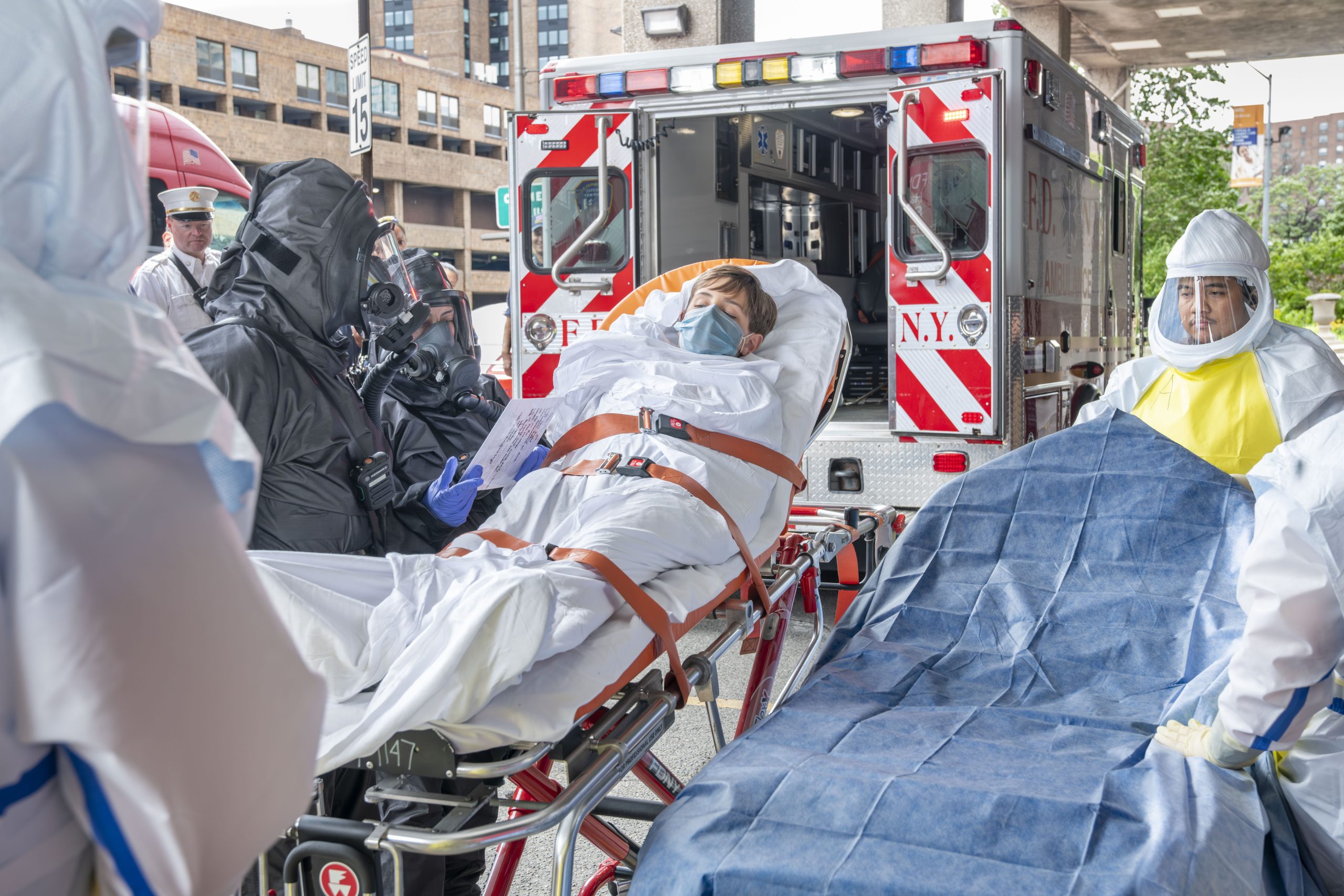
New York, NY — Today, NYC Health + Hospitals/Bellevue, alongside the New York City Health Department, FDNY, and NYC Emergency Management, participated in the international Tranquil Passport exercise to test the nation’s capability to safely and securely transport patients with highly pathogenic infectious disease from Canada to U.S. regional treatment centers. As a U.S. Department of Health and Human Services (HHS)-designated Regional Emerging Special Pathogen Treatment Center (RESPTC), Bellevue Hospital was the designated receiving hospital for the New York City portion of the exercise. New York City coordinated with State and federal partners to test the regional special pathogen transport plan, which ensures that patients with a high-consequence infectious disease, such as Ebola, can be quickly identified and brought to specialized facilities for care.
The four-day, large-scale patient movement exercise involved more than 50 international, federal, state, and local partners. The exercise began on June 24 with government officials facilitating a series of coordination calls to plan the movement of a cluster of American patients with a fictional high-consequence infectious disease from Toronto, Canada to the United States during the 2026 FIFA World Cup. Between June 25-27, pretend patients are arriving at Dulles International Airport and being transported to regional treatment centers in Washington, DC; Baltimore, Maryland; New York City; Atlanta, Georgia; and Chapel Hill, North Carolina. On June 25, the NYC Health Department led a preparatory call with the special pathogen care teams and FDNY Medical Affairs to assess clinical status prior to the patient’s arrival in NYC.
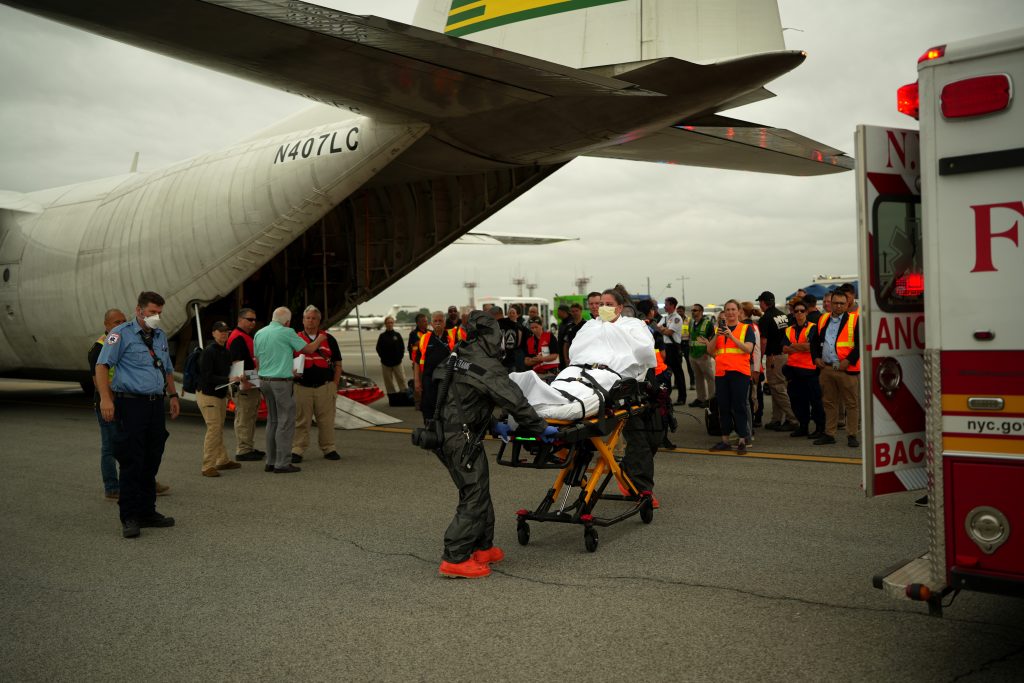
Earlier today, the two New York City-bound fictional patients were flown into LaGuardia Airport and transported to Bellevue Hospital, where emergency department staff transported the patients to the hospital’s biocontainment unit while practicing protocols to prevent the transmission of a highly contagious disease.
The exercise was designed to demonstrate HHS’s new Portable Biocontainment Unit, the first domestic resource for isolating and transporting patients with contagious infectious diseases over long distances. The Portable Biocontainment Unit can carry up to 10 patients with high consequence infectious disease and be transported by ground on the back of a standard trailer or by air.
Video sound bites of the exercise are available for download here, and photos of the exercise are available here.
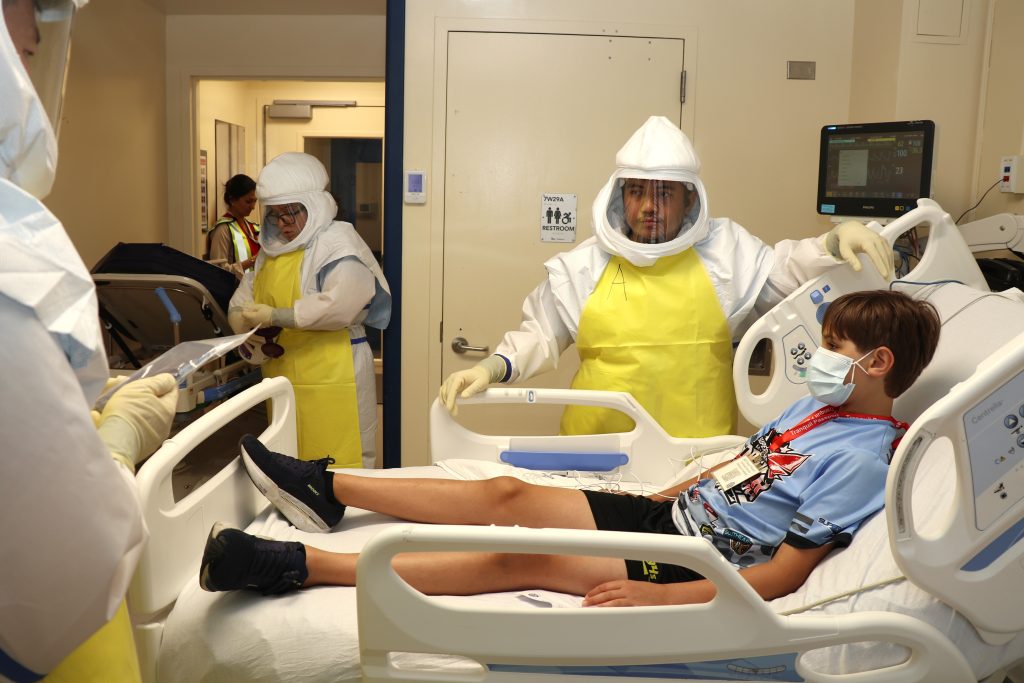
“Bellevue Hospital’s participation in this multi-site exercise allows us to test our preparedness and coordination with our national, regional, and local partners to maintain and improve current capabilities that protect the New York City metropolitan area from special pathogen threats,” said NYC Health + Hospitals/Bellevue Chief Executive Officer Eric Wei, MD, MBA.“Our hospital is uniquely qualified to provide high-quality special pathogen patient care. For almost 300 years, our providers have been the frontline of treatment and care for serious public health threats like smallpox, tuberculosis, HIV/AIDS, and Ebola.”
“Bellevue has long been at the forefront of preparing for and responding to special pathogen threats. Through the Tranquil Passport exercise, we are reinforcing our leadership role in advancing clinical readiness, innovating in biocontainment care, and strengthening healthcare and public health coordination across agencies,” said Vikramjit Mukherjee, MD, Director, Special Pathogens Program at NYC Health + Hospitals/Bellevue. “As the Regional Emerging Special Pathogen Treatment Center for HHS Region 2, we are committed to ensuring that our systems are not only ready—but setting the standard—for safe, effective care during high-consequence infectious disease events.”
“Exercises like Tranquil Passport allow us to identify and close real-world gaps before an emergency occurs,” said Dr. Syra Madad, Chief Biopreparedness Officer at NYC Health + Hospitals. “It’s how we stress-test the system to ensure it works for everyone, every time. Bellevue Hospital’s Special Pathogens Program is a national model in this work, leading the way in high-level isolation care and the comprehensive management of high consequence infectious diseases.”
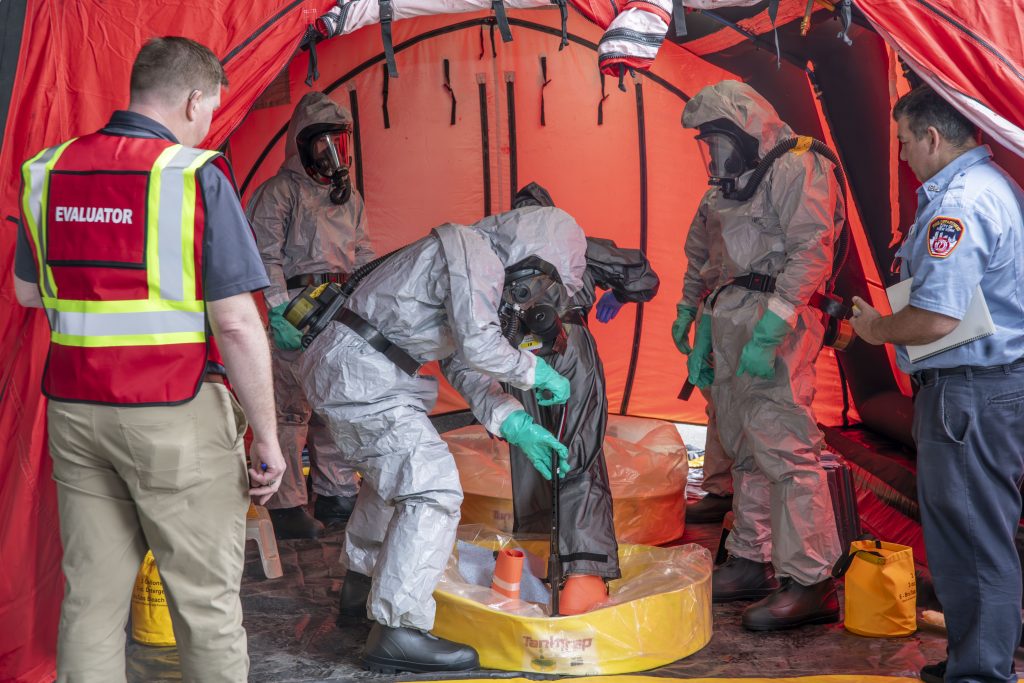
“Public health is grounded in prevention – and at the NYC Health Department, we stay ready. This includes regularly preparing and testing our emergency response capabilities to answer the call, whatever the challenge, whenever it arrives,” said Acting Health Commissioner Dr. Michelle Morse. “In partnership with agencies like NYC Health + Hospitals, NYCEM, and FDNY, our efforts prepare the city to protect New Yorkers’ lives. We are committed to continuously testing and enhancing our systems to support our city and respond to emergencies nationwide.”
“The threat of infectious disease is unfortunately always on the horizon, as we’ve seen with Ebola and mpox. Our EMTs, paramedics and firefighters are on the front lines of the risk these diseases present, and making sure we are prepared to handle them is critically important to keeping our city safe,” said Fire Commissioner Robert S. Tucker. “These kinds of drills ensure we are ready for every potential public health emergency possible, and we are proud to partner to make this happen.”
“Tranquil Passport gave us a chance to practice what it would take to care for patients with a serious infectious disease while keeping the public safe,” said NYC Emergency Management Commissioner Zach Iscol. “For New Yorkers, it means knowing that our hospitals, first responders, and city agencies are preparing together for the hardest kinds of emergencies. NYC Emergency Management coordinated real-time planning and communication across city, state, and federal partners to make sure every agency was ready and working from the same plan. We are grateful to the NYC Health Department for their leadership in response to special pathogens, NYC Health + Hospitals for their commitment to clinical excellence in special pathogen care, FDNY for their operational expertise and resources, and all our partners at the federal and local levels, including the Administration for Strategic Preparedness and Response, who made this exercise possible.”
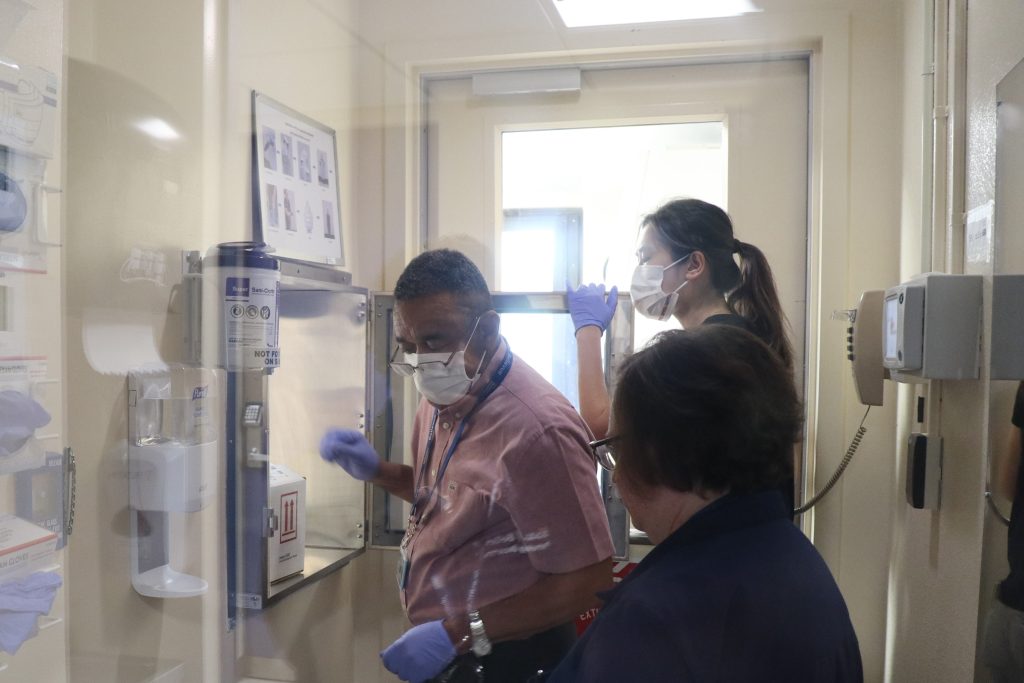
“This is a unique opportunity to test and examine the processes we use when we work with our partners to identify and minimize the impact of a high-consequence infectious disease,” New York State Health Commissioner Dr. James McDonald said. “Our excellent health care facilities and the systems we have in place to protect New Yorkers are among the best in the world, and this exercise will help to further build upon these capabilities.”
“I am deeply grateful to the teams at NYC Health + Hospitals/Bellevue and the NYC Health Department for their unwavering commitment to public health and emergency preparedness,” said Congressman Jerrold Nadler. “Exercises such as this one strengthen our national response to infectious disease threats and will save lives here in New York. I will continue working in Congress to secure robust federal funding to keep Bellevue and our city at the forefront of lifesaving care.”
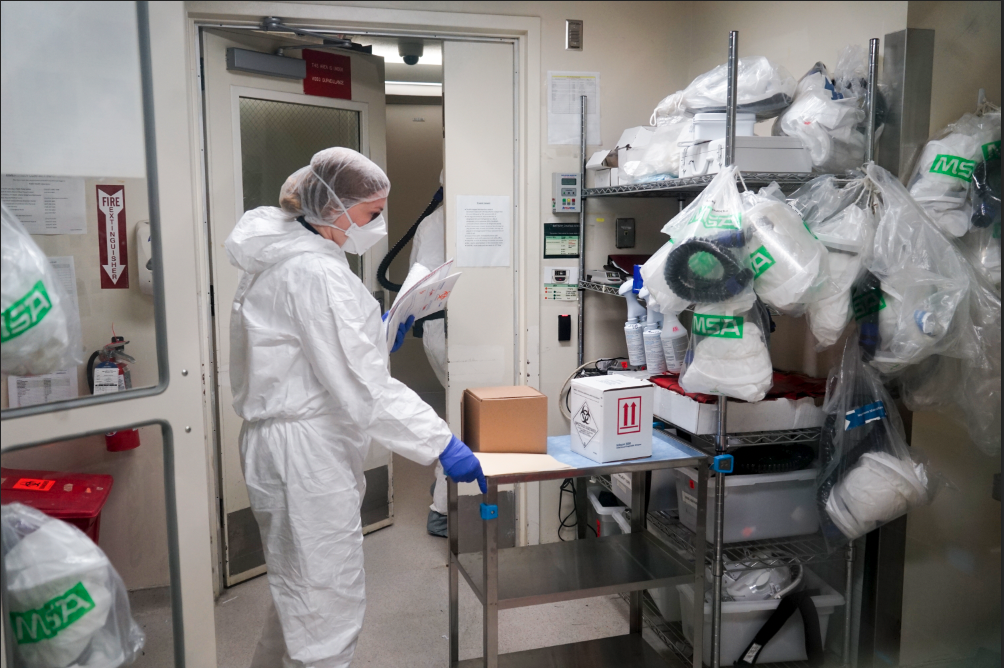
As the only remaining biocontainment unit in New York City, Bellevue Hospital will use this exercise to activate the Special Pathogen Unit and test the team’s preparedness to receive highly infectious patients. The exercise will validate the Special Pathogen Unit’s ability to:
- Provide high-quality care to pediatric patients suspected of or infected by a special pathogen;
- Coordinate with partner organizations such as the New York City Fire Department, NYC Health Department, NYC Emergency Management, and New York State Department of Health to safely transport patients to the Special Pathogen Unit;
- Use the Special Pathogen Unit’s new communication system that will streamline communication between the providers in PPE and the rest of the care team; and
- Facilitate a safe family member visit to a patient within the Special Pathogen Unit.
As the region prepares for an influx of travelers for the 2026 World Cup, Bellevue’s Special Pathogens Program and the NYC Health Department are working closely to strengthen existing capabilities to detect and protect our community from special pathogen threats. At a time when public health emergency funding is in jeopardy, this emergency exercise highlights the critical role federal resources play in our city’ emergency response and the need for New York City to stay ready for any emergencies that may threaten the health of New Yorkers – no matter how global, national or local. Lessons learned will inform future exercises and real-world responses.
Bellevue Hospital, the oldest public hospital in the United States, has a longstanding legacy in infectious disease management and is a recognized leader within the National Special Pathogen System (NSPS)—a nationwide, tiered network of care ranging from frontline facilities to advanced treatment centers. Bellevue Hospital’s Special Pathogens Program serves as the designated Level 1 Regional Emerging Special Pathogen Treatment Center (RESPTC) for HHS Region 2, which includes New York, New Jersey, Puerto Rico, and the US Virgin Islands. RESPTCs act as resource hubs, providing highly specialized care for patients suspected of, or infected by, special pathogens such as Ebola, mpox, or H5N1 bird flu.
For more information visit the ASPR press release about the exercise.
Video sound bites of the exercise are available for download here.
Photos of the exercise are available here.
# # #
MEDIA CONTACT: BellevuePublicRelations@nychhc.org, 212-562-4516
#103-25
About NYC Health + Hospitals/Bellevue
NYC Health + Hospitals/Bellevue is America’s oldest public hospital, established in 1736. Affiliated with the NYU Grossman School of Medicine, the 851-bed hospital is a major referral center for highly complex cases, with 6,000 employees including highly skilled, interdisciplinary clinical staff. The hospital is a Level 1 Trauma Center and annually it sees about 103,000 emergency room visits, and more than 520,000 outpatient visits. Clinical centers of excellence include: Emergency Medicine and Trauma Care; Cardiovascular Services; Bariatric Surgery; Designated Regional Perinatal Center and Neonatal Intensive Care Unit; Children’s Comprehensive Psychiatric Emergency Program; and Cancer Services. For more information, visit www.nychealthandhospitals.org/bellevue and follow us on Facebook and X (Twitter).
About NYC Health + Hospitals
NYC Health + Hospitals is the largest municipal health care system in the nation serving more than a million New Yorkers annually in more than 70 patient care locations across the city’s five boroughs. A robust network of outpatient, neighborhood-based primary and specialty care centers anchors care coordination with the system’s trauma centers, nursing homes, post-acute care centers, home care agency, and MetroPlus health plan—all supported by 11 essential hospitals. Its diverse workforce of more than 43,000 employees is uniquely focused on empowering New Yorkers, without exception, to live the healthiest life possible. For more information, visit www.nychealthandhospitals.org and stay connected on Facebook, Twitter, Instagram and LinkedIn.
